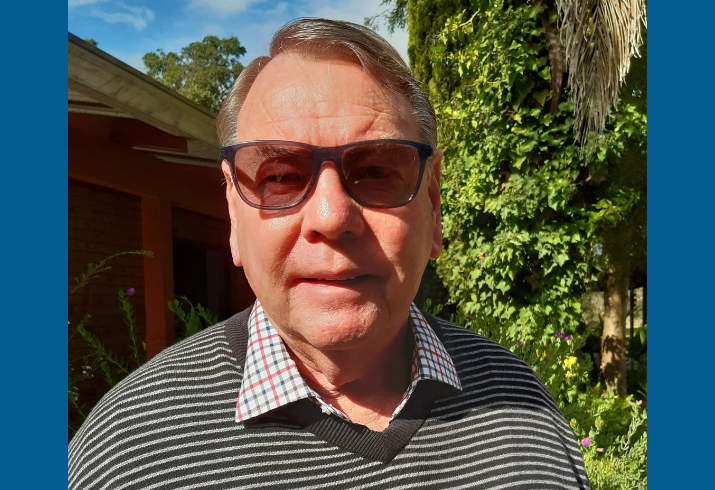Quick treatment saves Bunbury grandfather's life after stroke
 Stroke survivor Michael Hepburn.
Stroke survivor Michael Hepburn.
Fear struck Bunbury’s Michael Hepburn when he suddenly had the inability to speak. When the left side of his face started to droop, his wife Hannelore noticed, and the realisation started to kick-in – this is a stroke.
In Western Australia strokes are far too common. In 2020 2,706 Western Australians experienced a stroke for the first time, and more than 43,000 stroke survivors live among us.
In recognition of National Stroke Week (8 – 14 August), the WA Country Health Service is thankful to share Michael’s story - who is now one of those survivors, due to the quick response from Hannelore and the treating team at Bunbury Hospital.
“My wife recognised the stroke signs when I could not talk to her and drove me immediately to the emergency department,” Michael recounts his story.
When Michael arrived at the hospital within an hour of the symptoms, the Bunbury Hospital Emergency Department staff knew how vital it was to treat rapidly.
After a scan of Michael’s brain, it was revealed a large blood vessel in his brain was partially blocked by a clot, causing the stroke. While one small area was already affected, a large area of his brain remained at risk of permanent damage and could be saved.
Thanks to his rapid arrival at the hospital, Michael was eligible for thrombolysis – a therapy which can only be given within four and a half hours of the stroke symptoms starting and if the patient meets a strict checklist to ensure they are eligible. The treatment uses clot busting medicine to dissolve the dangerous blood clots causing the stroke.
WACHS South West Regional Stroke Coordinator, Renee Dehring, said the success of the treatment was a team effort and cause for celebration.
‘’Everyone worked so quickly to get Michael the care he needed and it is great that country people have access to lifesaving treatments delivered by dedicated clinicians, so close to home,” she said.
Michael’s care was aided by the WA Acute Stroke Pathways, which provides country clinicians access to specialist neurology advice from a tertiary hospital. The pathways ensure patients can receive the urgent care they need regardless of their location.
For Michael, this meant that after assessment by the medical team in Bunbury a Neurologist in Perth also reviewed his care and helped plan his treatment.
Michael was discharged within three days and is now happy and healthy at home.
Like many other Western Australians, the stroke came as a surprise. Michael has always been fit and healthy, and there were no prior warning signs or underlying medical conditions. This is why it is vital to remember the F.A.S.T. signs of strokes:
- Face – Check their face. Has their mouth drooped?
- Arms – Can they lift both arms?
- Speech – Is their speech slurred? Do they understand you?
- Time is critical. If you see any of these signs call 000 straight away.
Michael wasn’t aware of the symptoms of stroke and encourages everybody to think F.A.S.T. because it could save a life.
It has been over a year since the stroke, and while still taking things easy, Michael is back to spending time with his family, tending to their bush block, working part-time, and exercising regularly. The grandfather couldn’t be more thankful to the Bunbury Hospital team.
“I can’t praise staff at the Bunbury Hospital enough for their swift action, care and professionalism,” Michael said.
To learn more about the signs of stroke, please visit the Stroke Foundation website.

